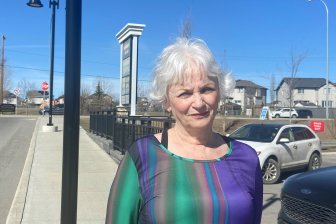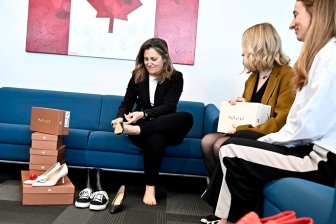With New York City poised to reopen after a more than two-month coronavirus shutdown, officials on Sunday lifted a curfew that was in place amid protests of police brutality and racial injustice. But they also urged that demonstrators be tested for COVID-19.

“Get a test. Get a test,” New York Gov. Andrew Cuomo told people who have been participating in rallies and marches in memory of George Floyd.
“I would act as if you were exposed, and I would tell people you are interacting with, assume I am positive for the virus.”
Cuomo said the state would open 15 testing sites dedicated to protesters so they can get results quickly. His call for demonstrators to proceed carefully is similar to those made in Seattle, San Francisco and Atlanta following massive demonstrations, with free testing for protesters.
New York has been the epicenter of the U.S. outbreak, with Black communities hit especially hard.
The Rev. Brandon Watts of Epiphany Church in Brooklyn, was mindful of the pandemic while organizing a “Pray & Protest” march with several other churches. He mandated that protesters wear masks, and he came with boxes of them. Attendees also were offered free coronavirus tests at one church.

“COVID-19 hit the inner city harder than anybody else,” Watts said. “And so we have to be very careful. We’re the only ones in a pandemic within a pandemic.”
In addition to suffering disproportionately from the the virus, the Black community also has been roiled by the death of Floyd, a Black man who died after a white officer pressed a knee into his neck while arresting him.
Floyd’s death renewed calls to reform policing in America and sparked massive protests throughout the country.
A heavy-handed police response to protesters in many places underscored what critics have maintained: Law enforcement is militarized and too often uses excessive force.

Cities imposed curfews as several protests last week were marred by spasms of arson, assaults and smash-and-grab raids on businesses.
More than 10,000 people have been arrested around the country since protests began, sometimes after violent confrontations with officers. Videos have surfaced of officers in riot gear using tear gas or physical force against even peaceful demonstrators.
But recent U.S. protests have been overwhelmingly peaceful — and over the weekend, several police departments appeared to retreat from aggressive tactics.
Several cities have also lifted their curfews, including Chicago and New York City, which is preparing to enter its first phase of reopening after virus shutdowns. Up to 400,000 people are expected to head back to the workplace Monday.
“Last night was the best by far,” Mayor Bill de Blasio said. “We had the biggest number of protesters, the fewest arrests, the fewest problems and that convinced me it was time for the curfew to go away.”
In Compton, California, several thousand protesters, some on horseback, peacefully demonstrated Sunday through the city, just south of Los Angeles. The only law enforcement presence was about a dozen sheriff’s deputies, who watched without engaging.
A similar scene played out on Saturday when thousands of protesters converged on San Francisco’s Golden Gate Bridge. Tow trucks held off car traffic, and police directed vehicles caught in the middle to go around protesters.

For the first time since protests popped up in New York more than a week ago, most NYPD officers were not wearing riot helmets as they watched over marches and rallies. Police moved the barricades at the Trump hotel at Columbus Circle in Manhattan for protesters and replaced when they passed through the area.
Mayor de Blasio said police had arrested just four people and issued 24 court summonses on Saturday — in stark contrast to more than 2,000 arrests made through Friday morning.

Even at Brooklyn’s Barclays Center, which has been the site of numerous faceoffs between protesters and police, officers stood by casually as hundreds of protesters gathered to observe a moment of silence for George Floyd. Some officers even shook hands and posed for photos with motorcyclists at the rally.
In Washington, D.C., National Guard troops from South Carolina were seen checking out of their hotel Sunday shortly before President Donald Trump tweeted he was giving the order to withdraw them from the nation’s capital.
At the newly renamed Black Lives Matter Plaza near the White House, protesters posed with the street sign and the yellow block lettering painted on the pavement by the city. As ice cream truck jingles mixed with protest chats, the district’s Metropolitan Police Department patrolled.
Meanwhile, in Minneapolis, the city where Floyd died, a majority of city council members vowed to radically overhaul policing. Council Member Jeremiah Ellison went so far as to promise the council would “dismantle” the agency.
The state of Minnesota launched a civil rights investigation of the department last week, and the first concrete changes came Friday when the city agreed to ban chokeholds and neck restraints.
“It is clear that our system of policing is not keeping our communities safe,” said Lisa Bender, the council president. “Our efforts at incremental reform have failed, period.”
Minneapolis Mayor Jacob Frey told protesters outside his house that he doesn’t support the “full abolition” of the police department. Protesters shouted back: “Shame! Shame!”

Floyd’s body arrived in Texas for a third and final memorial service, said Houston Police Chief Art Acevedo. A viewing is planned for Monday in Houston, followed by a service and burial Tuesday in suburban Pearland.
The 46-year-old out-of-work bouncer’s death at the hands of police has drawn new attention to the treatment of African Americans by law enforcement — in the United States and around the world.
At Atlanta Motor Speedway, NASCAR paused before Sunday’s Cup race to acknowledge the nationwide protests, in a remarkable moment for the sport with its roots in the South and one-time embrace of Confederate symbols.
During warm-up laps, the 40 cars pulled to a stop in front of the empty grandstands, and NASCAR President Steve Phelps spoke.
“The Black community and all people of colour have suffered in our country, and it has taken far too long for us to hear their demands for change,” Phelps said. “Our sport must do better. Our country must do better.”
Protesters in Bristol, England, tore down a statue of Edward Colston, a 17th century slave trader, and pushed it into the harbour of the port city in southwestern England.
A crowd estimated at 10,000, many in face masks, filled a square in Brussels, holding white roses and signs decrying racism. And outside the new U.S. Embassy in London, student Darcy Bourne said the demonstration was about “more than just George Floyd, more than just America, but racism all around the world.”
Kruesi reported from Nashville, Tennessee, and Pane from Boise, Idaho. Associated Press writers around the world contributed.



Comments